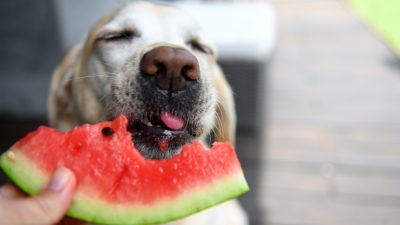Can Dogs Eat Watermelon

Can My Dog Have Down Syndrome?
July 28, 2022
5 Signs of Dog Ear Mites
August 8, 2022Can Dogs Eat Watermelon?
Many dog owners have seen people feeding their dogs watermelon or frozen watermelon treats. However, you may have also stopped and wondered if watermelon is actually OK to feed to dogs.
The short answer to this question is yes, watermelon makes for a healthy treat for most dogs. The only exception to this is if the dog is showing signs of being allergic to watermelon. Though watermelon allergies are somewhat rare in dogs, you should not feed a dog watermelon if they have a watermelon allergy or intolerance.
In this article we will be explaining everything that dog owners need to know about feeding their dogs watermelon. This includes what parts of the watermelon that dogs can eat and how much watermelon is safe to feed dogs. In addition to this, we will also be answering some other commonly asked questions about this topic. Let’s get into it!
What Fruit Can Dogs Eat?
Some dog owners may be surprised to discover that their dog can actually eat a wide variety of fruits. Here are some of the other kinds of fruits that are safe for dogs to eat in addition to watermelon.
- Bananas
- Apples (without the seeds)
- Cantaloupe
- Strawberries
- Blueberries
- Pineapple
- Oranges
- Mango
It is important to mention that any fruit should only be given to dogs in moderation. This is especially true when it comes to acidic fruits like oranges and pineapple. Additionally, many dogs do not enjoy the taste of these acidic fruits even though they are safe for them to eat.
Can Puppies Eat Watermelon?
Yes, puppies can eat watermelon. However, it is recommended to give watermelon to a puppy in smaller bite size pieces or in a puree form. This will prevent your puppy from choking or breaking their teeth on hard, frozen watermelon. In addition to this, you can also freeze watermelon puree on things like lick mats for puppies as well.
How Much Watermelon Can I Give My Dog?
Like most other foods, it is recommended that you give your dog watermelon in moderation. Keeping your dog’s watermelon intake to just a few pieces is best, and larger dogs can be allotted more than small dogs due to their differences in body size.
What Happens If A Dog Eats Watermelon?
If a dog just eats the red fruit of the watermelon then likely nothing is going to happen besides your dog finding out that they think watermelon is really tasty. However, the rind and seeds of the watermelon could present some potential hazards for dogs. As a result, it is recommended that you do not feed watermelon seeds or rind to your dog.
Can Watermelon Give Dogs Diarrhea?
In some cases a dog could get diarrhea when they eat watermelon. Most of the time this occurs because the dog simply eats way too much watermelon in one sitting. This is partially why it is best to only give dogs watermelon in moderation.
If your dog gets diarrhea after only eating a small amount then it is possible that your dog may have a food allergy or intolerance to watermelon. If you believe that this is the case for your dog then feeding them watermelon may not be the best idea.
Can Dogs Eat Watermelon Seeds?
It is not recommended that you let your dog eat watermelon seeds. This is because these seeds are very difficult to digest, and they can cause a blockage in a dog’s digestive tract. This is a particular risk for puppies and small dogs.
As a result, it is recommended that you take as many seeds out of a piece of watermelon as you can before feeding it to your dog. This will prevent a blockage. Though, you do not need to worry too much if your dog eats just one or two watermelon seeds.
Can Dogs Eat Seedless Watermelon?
Yes, dogs can eat seedless watermelon. In fact, a seedless piece of watermelon is the best kind of watermelon to feed your dog.
Can Dogs Eat Watermelon Rind?
No, dogs cannot eat the watermelon rind. The rind is the skin and white part of the watermelon, and it is very hard and tough in texture. This also means that watermelon rind is very difficult for dogs to digest.
Like watermelon seeds, watermelon rind could potentially cause a blockage in a dog’s GI tract. This is especially true when it is eaten in large amounts. In addition to this, some dogs may also be at risk for damaging their teeth when chewing on watermelon rind as well.
Can Dogs Have Watermelon Juice?
Watermelon juice that contains no added sugars or artificial sweeteners is fine to give dogs. This is because this kind of juice provides dogs with nutrients while also not being too unhealthy for them to drink. However, like watermelon fruit, it is recommended that you only give your dog watermelon juice in moderation.
Health Benefits Of Watermelon For Dogs
There are three main health benefits of watermelon for dogs. The first benefit of feeding your dog watermelon is that it is packed full of nutrients. This is because watermelon is a great source of Vitamin C, Vitamin A, Potassium, and Vitamin B6. Feeding your dog a diet that is high in vitamins and minerals like these supports good health, growth, and development.
Watermelon is an excellent source of fiber and water as well. Fiber is great for supporting healthy digestion in dogs, and the large amounts of water that watermelon contains can help keep a dog hydrated. This makes watermelon a particularly good snack for a dog on a hot summer day.
What Fruits Are Bad For Dogs?
Although many fruits are fine and even very healthy for dogs to eat, some others are toxic to dogs. Here are some fruits that you should never feed your dog.
- Grapes (and raisins)
- Cherries
- Avocados
- Tomatoes
- Lemons
- Limes
Considering that the above fruits can potentially harm your dog, it is best to keep them well out of a dog’s reach. In addition to this, you should also call your vet immediately if your dog eats any of the above fruits even if they do not seem to be sick in that moment.





